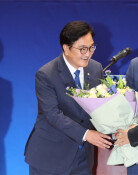Baseball Scouts Are On the Job 24/7

We go wherever there are baseball players. Some days, we watch four games. We go to the players houses and talk to their parents all night. But we only work outside the baseball field.
These are baseball scouts. They are the agents that help strengthen baseball teams.
Scouts are busy all through the winter, even after the baseball season and various amateur championships end. They have to travel all across the country to find talent.
There are about 20 scouts among Koreas eight pro baseball teams. Most are ex-professional players. Lets look into the world of these former ballplayers who now scour baseball fields to look for prospects.
Living in ballparks-
Yoo Ji-hong, the head scout of LG, is visiting Jinju and Namhae in South Gyeongsang Province, and Yeosu in South Jeolla Province. At times he travels overseas to the Philippines, Taiwan, or Thailand to scout high school players during the winter training season.
Just ten years ago, nine out of ten high school players said they would choose college over going pro. Now most decide to go straight to the pros. Money has become more important than a college degree.
During amateur championships for elementary, middle and high school teams, these baseball scouts practically live in the ball park. They scrutinize the players movements and physiques. Once they have selected a target to focus on, they take action. They start the agonizing process of meeting with the parents and convincing them that pro baseball is their progenys ticket.
When the scouts decide one is a big catch, they visit the player every day. They sometimes wait overnight in front of the players house to meet the parents, so that they do not lose him to another scout.
There are various responses from the players and their parents to this. Some are desperate, and beg to at least put him in the minors, while some are more gutsy, saying, Our son will be as big as Ichiro Suzuki (Seattle Mariners) so he needs at least a six figure contract. But once these players enter the majors, they enjoy varying degrees of success. Players who were stars in the amateur leagues cannot survive in the big leagues if they fail to adjust to life in baseball.
Failure Blamed on Scouts-
When scouts find a prospect that becomes big, the coach gets the glory. But when it goes wrong, the scout can be held responsible for the failure.
Kim Jin-cheol, a 19-year veteran scout for Hyundai, said, Jeong Min-tae, one of our pitchers, was out of commission because of an elbow injury right after he entered the team. The team blamed me for not bringing Kwon Myeong-cheol (Doosan). But after Min-tae came back and the team won, the blaming disappeared.
Of course, these scouts go through trial and error during their transition from baseball player to scout.
Yoo Ji-hong was an infielder for MBC and LG from 1985 to 1990 and has been a scout for LG for 11 years. When I first became a scout, I didnt even know how to make a document, he reminisces.
Jang Hyo-jo was the king of hitters during his player days from 1983 to 1992, with a batting average of .331. He now scouts prospects for Samsung. I didnt know scouts had such a large influence on the team when I was playing ball. It is really gratifying to see the whole team improve when I bring a good player to the team.
beetlez@donga.com







